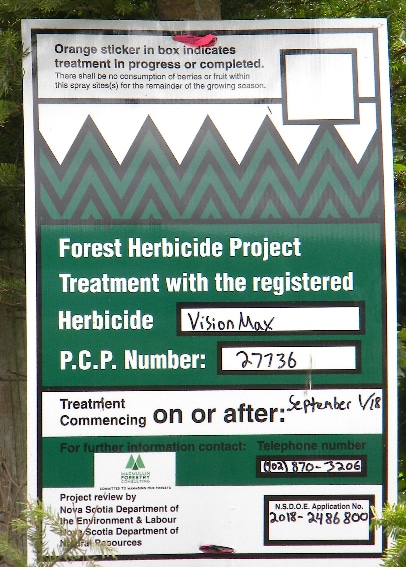Letter of concern by Guysborough resident Alexander Bridge, re this year’s glyphosate spraying program announced earlier this summer.
August 18, 2018
An open letter of concern
As a resident of Boylston, Nova Scotia, allow me to share my concerns and extreme disappointment with our provincial government’s weak forestry regulations, given our elected officials have made no attempt to review or stop this industry’s controversial herbicide spraying across the province.

I was recently reminded of the fact we are on the cusp of a critical situation after seeing public postings on land in the Boylston and Guysborough areas, for a planned herbicide spraying of hundreds of acres of woodland this September. This spraying, using the environmentally unfriendly chemical Vision Max, with its major active ingredient glyphosate, is being done on behalf of Northern Pulp of New Glasgow, who will eventually harvest the softwood, after killing off the hardwood with this toxic chemical.
Unlike Port Hawkesbury Paper, Northern Pulp does not adhere to the Forestry Stewardship Council’s (FSC) certification for best forestry practices; the more stringent of two major forest management certification schemes. The other, SFI is a completely meaningless certification, invented by the industry. FSC is based on a strict policy of non-spraying. (Glyphosate is also the primary active ingredient found in the controversial garden product Roundup. Remember too, it was Monsanto who also introduced Agent Orange and PCB’s to the world.)
Glyphosate performs two primary functions in fertile soil which is a living organism, rich in beneficial microbes; it robs plants of vital nutrients and weakens their immune defenses, resulting in their systematic destruction and eventual death. Today, in many countries worldwide, government agencies as well as their scientific communities, recognize glyphosate as having a direct link to causing cancer. The herbicide not only affects people, but animals, wildlife, their habitat, (plants, soil, water) and even the beneficial insects found in our woodlands. The forest industry says these herbicides hardly even touch the forest floor, yet in actual fact, they remain in the soil for over a year. Northern Pulp, describes the chemical as ‘low risk”. And here in Nova Scotia, our government regulatory agencies have given this chemical a pass rating too.
All my life, I have consistently advocated for transparency between our elected government officials at every level; federal, provincial or municipal and we the citizens they serve. When something as dangerously invasive as Vision Max is blessed by Dr. Robert Strang, the province’s chief medical officer, I know there is something sadly wrong. To the best of my knowledge at this point, Randy Delorey, Minister of Health, has not discussed glyphosate spraying. I wonder if Dr. Strang or Minister Delorey would eat blueberries from land sprayed with glyphosate?
Much has been written about a recent US court case that determined glyphosate did, in fact, cause cancer (non-Hodgkin’s lymphoma) and that Monsanto used “malice” in its manipulation of the science to keep the risks of glyphosate from the public and government regulatory agencies. The company paid a huge settlement of $289 million to the plaintiff while maintaining it had done nothing wrong. There are more cases pending against Monsanto and its products this year in the US. Here in Canada pesticides poison over 6000 people annually; almost half are young children.
So what does all this tell us? It tells me that it is now imperative for our regulatory agencies to revisit the “science” they are using to determine if glyphosate is safe for us all. We are certainly short on transparency in these province-wide spraying programs. Over the last two years, the Department of Environment no longer posts the way the spraying is being done or the actual areas being sprayed. The setback areas are extremely small and who might I ask is monitoring the wind conditions and whether the aerial spraying is being done correctly? We know from the Nova Scotia Auditor General’s report last year that NS Environment has been found often negligent in the monitoring of the many projects it approves.
This hazardous chemical can be found in the food we eat, in our farmlands, in the air and water… globally everywhere. So why is it that companies are spraying forestland in Nova Scotia too? Because the race-to-the-bottom pulp industry here wants to eliminate hardwoods, allowing only softwoods to grow. The industry refers to the practice almost in code as “conifer release”. This demonstrates an extremely unhealthy way to manage the forests. Instead of promoting monoculture for low-value pulp, forestry mills should be doing selective harvesting on our naturally diverse and mixed Acadian forests, to produce higher value wood and add value to that same wood.
If you share these concerns, I would urge you to write to the premier, share those concerns with your family, friends, your MLA, MP and local municipal council members, expressing the need to oppose herbicide spraying of our forests until conclusive scientific evidence can prove its safety. This represents a critical situation for all of us and for the generations to come. This important issue deserves citizens’ immediate action.
Sincerely,
Alexander Bridge
If you can, please support the Nova Scotia Advocate so that it can continue to cover issues such as poverty, racism, exclusion, workers’ rights and the environment in Nova Scotia. A paywall is not an option, since it would exclude many readers who don’t have any disposable income at all. We rely entirely on one-time donations and a tiny but mighty group of dedicated monthly sustainers.
Subscribe to the Nova Scotia Advocate weekly digest and never miss an article again.




Nice to see this picked up and posted by Woods and Waters Nova Scotia. This letter should be widely circulated – and heeded.
Considering glysophates like round up just cost Monsanto almost quarter of a billion dollars for their knowingly causing cancer should be enough to put on the breaks. But our government is obviously built on ill intentions towards us, the people.
Land that has been sprayed with glyphosate-based chemicals can do a lot of damage to watersheds as well.
Check out: https://www.ecowatch.com/glyphosate-sprayed-on-gmo-crops-linked-to-lake-eries-toxic-algae-bloom-1906543478.html
Years ago, Monsanto promised that agent orange was harmless to humans. Of course, over time, we learned otherwise. With the recent $289 million decision against Monsanto, perhaps the pigeons are coming home to roost now.
http://buzzflash.com/commentary/fight-against-glyphosate-could-reignite-push-for-agent-orange-justice